Blog
Innovative Solutions for Enhancing Your Countertop Kitchen Experience
In today's fast-paced culinary landscape, the "Countertop Kitchen" has emerged as a focal point for both functionality and design, with kitchens increasingly becoming the heart of the home. According to a report by the National Kitchen & Bath Association (NKBA), nearly 75% of homeowners are investing in kitchen renovations, with a significant emphasis on enhancing countertops and workspace functionality. Innovations such as smart surfaces and multifunctional countertops are transforming these areas into hubs of efficiency, creativity, and style. By integrating technology and design, today's countertop kitchens are not just about aesthetics, but also about improving user experience and maximizing space. This blog explores innovative solutions that can elevate your kitchen experience, ensuring that your countertop serves as more than just a workspace, but a true culinary ecosystem.

Innovative Countertop Materials: Balancing Aesthetics and Durability for Modern Kitchens
 In the modern kitchen, selecting the right countertop materials is crucial to achieving both aesthetic appeal and lasting durability. Innovative materials, such as quartz and recycled glass, are increasingly preferred due to their resistance to scratches and stains, providing a practical solution without compromising on style. A report highlighting the kitchen sinks market anticipates growth driven by varied material choices including stainless steel and granite, which complements the trend of pairing countertops with high-quality sinks. The synergy between these components enhances not just functionality but also the overall kitchen aesthetic.
In the modern kitchen, selecting the right countertop materials is crucial to achieving both aesthetic appeal and lasting durability. Innovative materials, such as quartz and recycled glass, are increasingly preferred due to their resistance to scratches and stains, providing a practical solution without compromising on style. A report highlighting the kitchen sinks market anticipates growth driven by varied material choices including stainless steel and granite, which complements the trend of pairing countertops with high-quality sinks. The synergy between these components enhances not just functionality but also the overall kitchen aesthetic.
Moreover, as interior design trends evolve, homeowners are embracing eco-friendly options that blend sustainability with sophistication. The latest kitchen trends reflect a shift towards materials that are not only visually appealing but also environmentally conscious. Reports indicate that consumers are increasingly aware of their choices, leading to a demand for materials that minimize their carbon footprint without sacrificing design. This balance between aesthetics and practicality is redefining kitchen designs for 2025, making informed decisions essential for creating a modern and stylish culinary space.
Smart Kitchen Technology: Transforming Countertops into Functional Culinary Hubs
In today's fast-paced world, smart kitchen technology is revolutionizing the way we interact with our countertops, transforming them into functional culinary hubs. Imagine a countertop embedded with touchscreen interfaces that allow you to access thousands of recipes, find cooking tutorials, or even adjust your kitchen appliances' settings—all at your fingertips. These innovations not only streamline your cooking experience but also bring a level of efficiency and creativity that was unimaginable just a few years ago.
Additionally, smart countertops can integrate with other kitchen devices through IoT (Internet of Things) technology. This means you can control your oven, refrigerator, and even your coffee maker, directly from your countertop. Some systems come equipped with built-in scales and timers, enabling precise measurements and cooking assistance, which is essential for both novice cooks and culinary enthusiasts. As kitchens evolve, these smart solutions enhance culinary experiences by fostering an environment where efficiency meets creativity, allowing for seamless meal preparations and enjoyable cooking adventures.
Innovative Solutions for Enhancing Your Countertop Kitchen Experience
Sustainability in Kitchen Design: Eco-Friendly Countertop Solutions for the Conscious Consumer
Sustainable kitchen design is gaining momentum, especially in the realm of countertop solutions that cater to the needs of the eco-conscious consumer. As we navigate through modern lifestyle choices, it's essential to consider how our kitchen spaces reflect our values, particularly when it comes to sustainability. Innovative materials are now emerging, featuring recycled content and lower environmental impact, which not only enhance the aesthetics of our kitchens but also contribute to a healthier planet.
The projected growth of the embedded trash can market highlights this shift in consumer behavior towards integrating functionality and sustainability in kitchen design. With a market expected to reach approximately $4.44 billion by 2033, the growing demand for these eco-friendly solutions emphasizes the importance of efficient waste management in kitchens. Incorporating such solutions not only streamlines kitchen organization but also allows homeowners to take an active role in promoting sustainability. By making conscious choices in countertop materials and waste management systems, consumers can transform their kitchen experience into one that is both innovative and environmentally responsible.
Maximizing Space: Creative Countertop Configurations for Small Kitchen Challenges
In small kitchens, every square inch counts, and maximizing countertop space can transform your cooking experience. Consider incorporating a foldable countertop extension. This innovative solution can provide extra workspace when needed and can be neatly tucked away when not in use. Such a design allows you to maintain an open and airy feel, crucial for compact areas. Pair this with magnet strips for knives and utensils to keep frequently used tools within arm’s reach without cluttering the countertops.
Another creative configuration involves using vertical space creatively. Installing shelves or pegboards above your countertops can free up valuable surface area while making kitchen essentials easily accessible. Additionally, consider multi-functional furniture—like an island on wheels, which can serve as both a prep area and a dining spot. These versatile pieces can be moved around to suit your cooking needs and are perfect for making the most of limited space. With the right strategies, you can enhance both functionality and aesthetics in your small kitchen.
Innovative Solutions for Enhancing Your Countertop Kitchen Experience
| Configuration Type | Description | Space Utilization (%) | Recommended Accessories |
|---|---|---|---|
| L-Shaped Counter | Utilizes corner space effectively, suitable for small kitchens. | 85% | Corner shelves, knife blocks |
| Foldable Countertop | Can be folded away when not in use, saving space. | 75% | Folding chair, portable cutting board |
| Island Counter | Provides additional workspace and storage in the center of the kitchen. | 90% | Under-island storage, bar stools |
| Wall-Mounted Counter | Saves floor space by attaching to the wall, ideal for minimal kitchens. | 70% | Wall brackets, spice racks |
| U-Shaped Counter | Encircles the kitchen with workspace, effective for multitasking. | 95% | Pull-out drawers, integrated appliances |
Health and Safety: Incorporating Sanitary Countertop Options in Kitchen Designs
When designing a kitchen, incorporating sanitary countertop options is essential for both health and safety. The kitchen countertop is a primary workspace where food preparation occurs, making it crucial to choose materials that are non-porous and resistant to bacteria. Options such as quartz, stainless steel, and high-density laminate not only provide durability but also offer a smooth surface that can be easily sanitized. These materials can withstand harsh cleaning agents, ensuring that any harmful pathogens are eliminated, thus promoting a healthier cooking environment.

Moreover, innovative countertop designs are integrating antimicrobial technology, which actively inhibits the growth of bacteria and fungi. This advancement offers an extra layer of protection, particularly in busy kitchens where cross-contamination risk is higher. Choices like antimicrobial-treated surfaces or those made from sustainable materials infused with natural antimicrobial properties not only enhance the aesthetic appeal but also provide peace of mind. By prioritizing health and safety in countertop design, homeowners can create a more hygienic kitchen space that aligns with modern wellness trends.
Related Posts
-
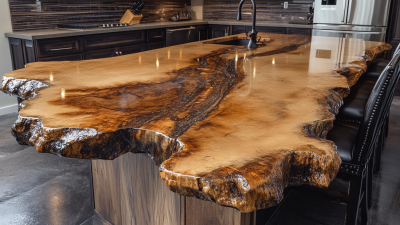
The Definitive Handbook to Custom Counter Tops: Elevate Your Space with Style and Functionality
-
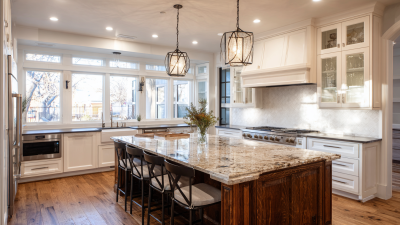
The Ultimate Guide to Choosing the Best Custom Countertop for Your Home Renovation
-
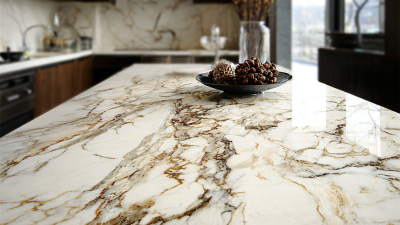
Global Best Countertop Marble from China Innovative Craftsmanship Ensures Quality for All
-
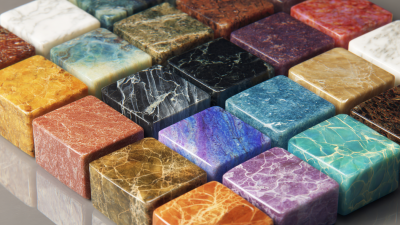
Unmatched Quality: Why Global Buyers Trust China's Premier Countertop Materials
-
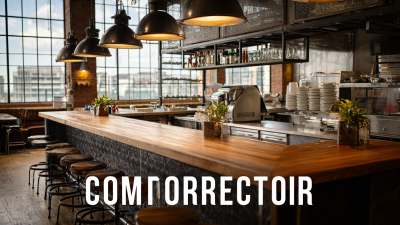
7 Reasons Why the Best Commercial Countertop Is Essential for Your Food Business Success
-
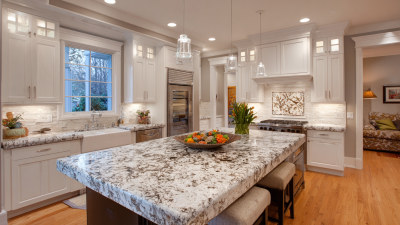
How to Choose the Best Stone Countertop for Your Kitchen ডিজাইন
